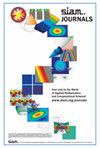A Majorization-Minimization Algorithm for Neuroimage Registration
IF 2.1
3区 数学
Q3 COMPUTER SCIENCE, ARTIFICIAL INTELLIGENCE
引用次数: 0
Abstract
SIAM Journal on Imaging Sciences, Volume 17, Issue 1, Page 273-300, March 2024.Abstract. Intensity-based image registration is critical for neuroimaging tasks, such as 3D reconstruction, times-series alignment, and common coordinate mapping. The gradient-based optimization methods commonly used to solve this problem require a careful selection of step-length. This limitation imposes substantial time and computational costs. Here we propose a gradient-independent rigid-motion registration algorithm based on the majorization-minimization (MM) principle. Each iteration of our intensity-based MM algorithm reduces to a simple point-set rigid registration problem with a closed form solution that avoids the step-length issue altogether. The details of the algorithm are presented, and an error bound for its more practical truncated form is derived. The performance of the MM algorithm is shown to be more effective than gradient descent on simulated images and Nissl stained coronal slices of mouse brain. We also compare and contrast the similarities and differences between the MM algorithm and another gradient-free registration algorithm called the block-matching method. Finally, extensions of this algorithm to more complex problems are discussed.
神经图像注册的主要化-最小化算法
SIAM 影像科学杂志》第 17 卷第 1 期第 273-300 页,2024 年 3 月。 摘要基于强度的图像配准对于三维重建、时间序列配准和共坐标映射等神经成像任务至关重要。通常用于解决这一问题的基于梯度的优化方法需要仔细选择步长。这一限制带来了大量的时间和计算成本。在此,我们提出了一种与梯度无关的刚性运动配准算法,该算法基于大化最小化(MM)原理。我们基于强度的 MM 算法的每次迭代都会简化为一个简单的点集刚性配准问题,其闭合形式解完全避免了步长问题。本文介绍了该算法的细节,并推导出更实用的截断形式的误差边界。在模拟图像和 Nissl 染色的小鼠大脑冠状切片上,MM 算法的性能比梯度下降算法更有效。我们还比较了 MM 算法和另一种无梯度配准算法(即块匹配法)之间的异同。最后,我们还讨论了该算法在更复杂问题上的扩展。
本文章由计算机程序翻译,如有差异,请以英文原文为准。
求助全文
约1分钟内获得全文
求助全文
来源期刊

SIAM Journal on Imaging Sciences
COMPUTER SCIENCE, ARTIFICIAL INTELLIGENCE-COMPUTER SCIENCE, SOFTWARE ENGINEERING
CiteScore
3.80
自引率
4.80%
发文量
58
审稿时长
>12 weeks
期刊介绍:
SIAM Journal on Imaging Sciences (SIIMS) covers all areas of imaging sciences, broadly interpreted. It includes image formation, image processing, image analysis, image interpretation and understanding, imaging-related machine learning, and inverse problems in imaging; leading to applications to diverse areas in science, medicine, engineering, and other fields. The journal’s scope is meant to be broad enough to include areas now organized under the terms image processing, image analysis, computer graphics, computer vision, visual machine learning, and visualization. Formal approaches, at the level of mathematics and/or computations, as well as state-of-the-art practical results, are expected from manuscripts published in SIIMS. SIIMS is mathematically and computationally based, and offers a unique forum to highlight the commonality of methodology, models, and algorithms among diverse application areas of imaging sciences. SIIMS provides a broad authoritative source for fundamental results in imaging sciences, with a unique combination of mathematics and applications.
SIIMS covers a broad range of areas, including but not limited to image formation, image processing, image analysis, computer graphics, computer vision, visualization, image understanding, pattern analysis, machine intelligence, remote sensing, geoscience, signal processing, medical and biomedical imaging, and seismic imaging. The fundamental mathematical theories addressing imaging problems covered by SIIMS include, but are not limited to, harmonic analysis, partial differential equations, differential geometry, numerical analysis, information theory, learning, optimization, statistics, and probability. Research papers that innovate both in the fundamentals and in the applications are especially welcome. SIIMS focuses on conceptually new ideas, methods, and fundamentals as applied to all aspects of imaging sciences.
 求助内容:
求助内容: 应助结果提醒方式:
应助结果提醒方式:


